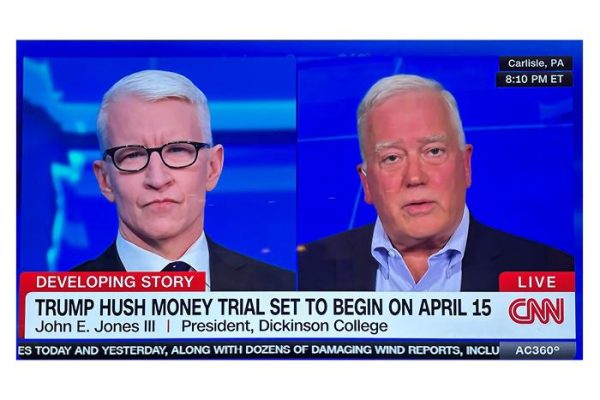Tree Club Hopes to Follow up on October Pipeline Protest
On Oct. 27, 2016 the Tree Club, the environmental activist club on campus, put on a demonstration on Britton Plaza to protest the Dakota Access Pipeline. Since then, the pipeline construction has resumed under President Donald Trump, which has prompted the Dickinson College Tree House to organize new protests.
The October demonstration at Dickinson involved the students making a “human pipeline” across the plaza, only allowing other Dickinson community members to pass by way of the seal – a superstitious landmark which most students tend to avoid. They held signs that were then placed around the HUB for the community to view reading “No DAPL” and other similar messages.
Since then, the construction on DAPL was halted by President Obama on Dec. 4, 2016 and then reactivated by President Trump on Jan. 24, 2017, both with executive orders. Protesters across the country have been participating in rallies against the pipeline but activity has been centralized at the Standing Rock Indian Reservation, where the local Sioux tribe is trying to protect sacred land.
As to whether the Tree Club plans on renewing their attempts to support the No DAPL campaign: “We’re looking to participate in some more protests,” says Rachel Gross ’19, co-leader of the Tree Club and one of the organizers of the protest last semester. “We want to get the club out to different places, but just having a space where we can have an open dialogue about it is important,” she says.
While the Standing Rock protests have continued, they have received less media coverage than they did in December. According to Gross, media coverage is essential to a successful protest.
“Yeah, I absolutely think that if the media covered it more and if it was still on the front page…I mean…I’d like to think that the government listens to the will of the people,”
Gross also maintained that Trump’s agenda towards Native Americans is not a new phenomenon.
“It seems like Trump is staying consistent with how the US government has treated the Native Americans throughout time. I’m honestly frustrated and angry,” said Gross. “Best case scenario the government doesn’t allow the pipeline to be built and put out a statement clarifying that it is illegal to steal Native American land. Worst case scenario, they build this pipeline and it breaks, like it probably will, and ruins their water supply. It’s just a complete disruption of their rights.”
This “worst case,” according to the Washington Post, is plausible. According to the Post, the company who is building the pipeline, True Companies, has what the Post referred to as “a history of spills in the region.”
People looking to get involved with the Tree House protests can email Gross at [email protected] or like the Tree House Facebook page.



